Nothing could be more natural than a glass of premium not from concentrate orange juice, right? After all the box has a photo of an orange with a straw in it.
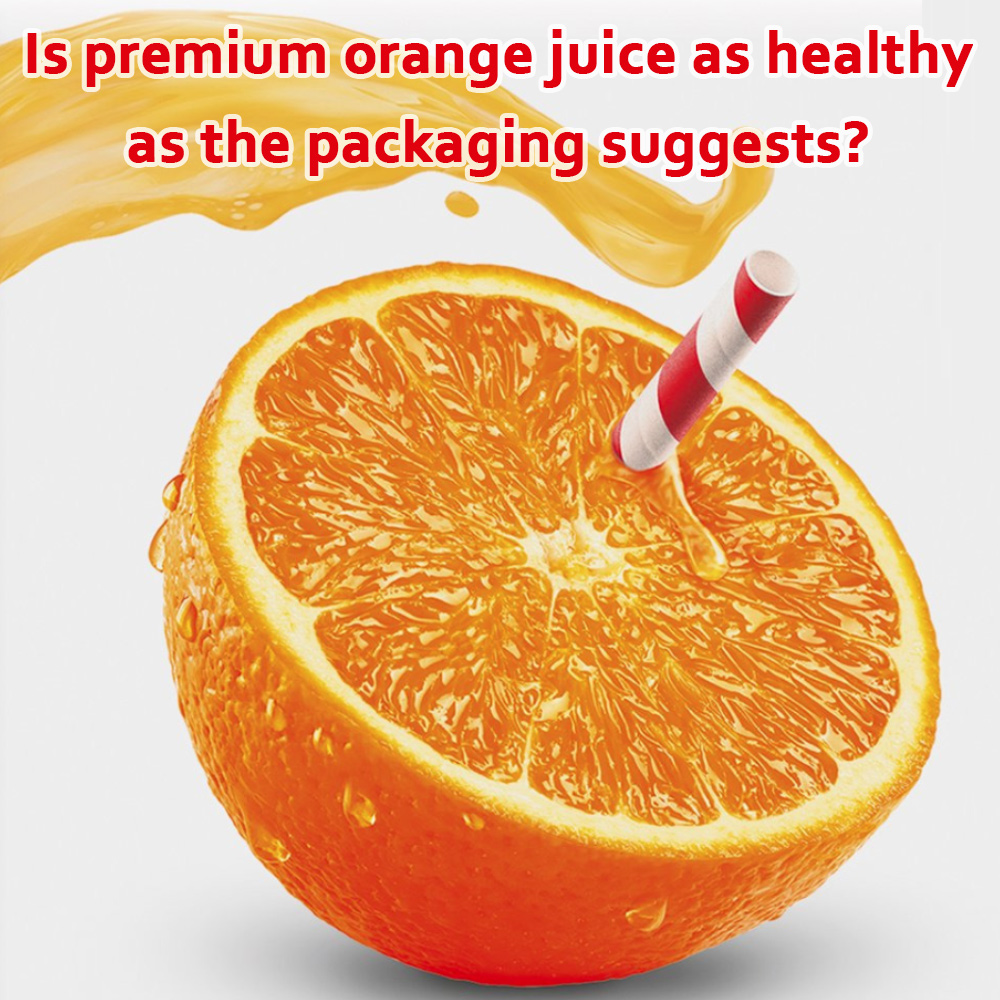
Not all juice is created equal
Juice is juice, so all they’ve done is press oranges and bottle right? Sadly no, even the premium orange juice brands involve chemistry.
Mass food producers need to make the most profit and that isn’t achieved using the same process we would at home to make orange juice.
You’re lead to believe that all of the high-end orange juice is just taken from an orange grove then pressed into a bottle. Manufacturers work hard with their branding and advertising to make their juice look healthy, natural and pure and hide what actually happens.
Orange juice pressed and stored for a year
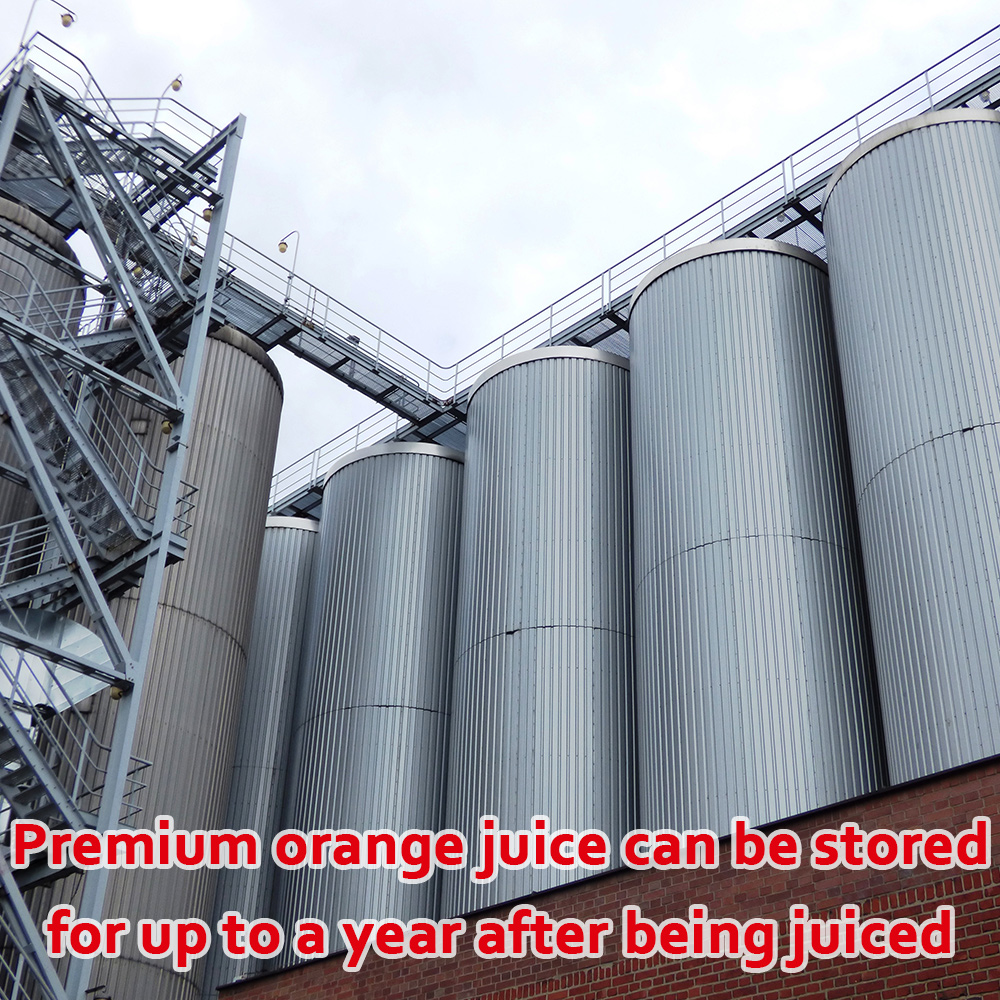
Once oranges are picked they’re juiced, pasteurised and then stored in vats for up to a year. All of the oxygen is removed from the long storage juice vats to prevent the orange juice from going bad.
Manufacturers need to store juice in order to have a consistent supply year-round. In the modern world full of processed foods people expect to have the same product all year regardless of the season.
Fresh orange juice has a shelf life of a few days when stored in the fridge. This kind of shelf life is incompatible with supermarkets, the modern food chain and however over 99% of western people shop.
Hidden added ingredients in 100% orange juice that the label won’t show
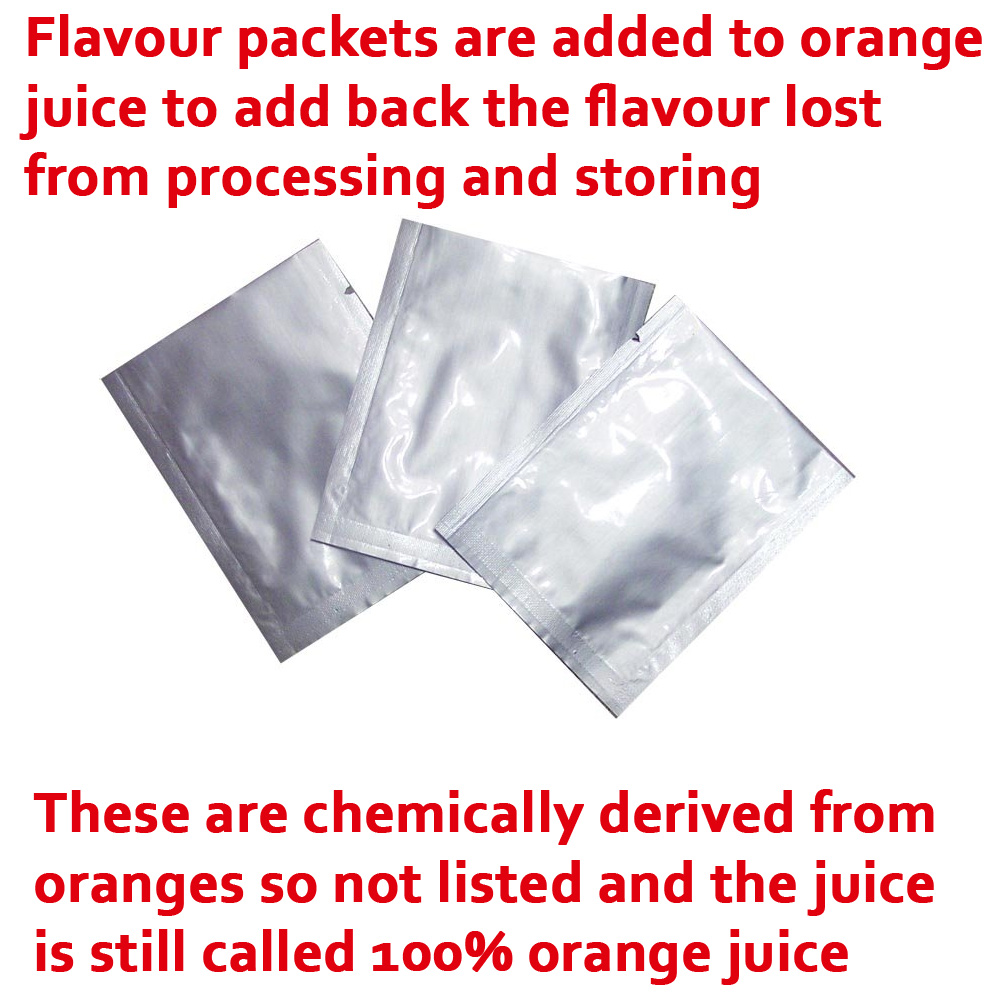
The storing and pasteurisation of orange juice does understandably affect the taste. So much taste is lost due to the processing and storing that the orange juice would be sweet but very lacking in flavour if it was just bottled straight from storage.
In order to add the taste back into the orange juice and make it taste more like when it was fresh flavour packs are used.
These flavour packs use ingredients derived from oranges so legally they aren’t on the packet * . However they may come from oranges at some point but they’ve been extracted and isolated in labs and at levels not found in nature.
Consumers want the same taste every time
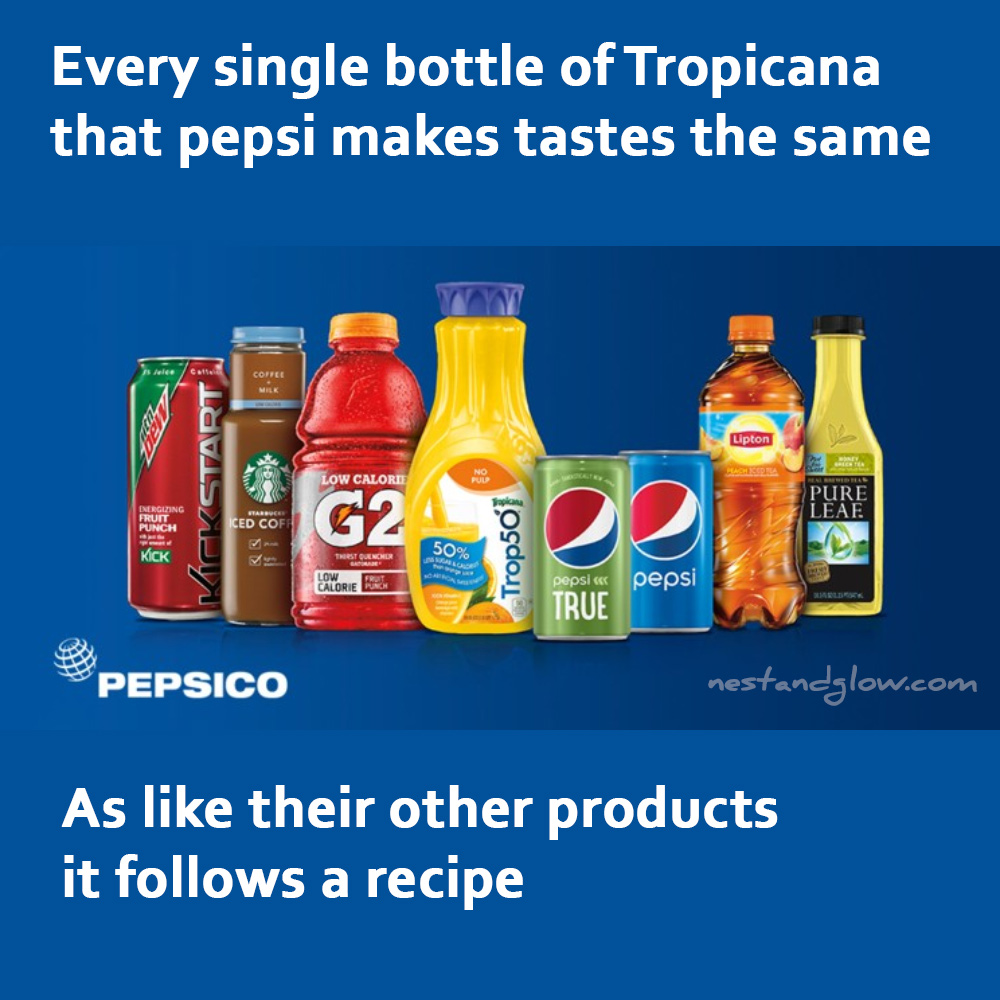
Coca-cola and Pepsi want their premium not from concentrate juice brands of Tropicana and Minute maid to always taste the same to please customers. That’s why the flavour packs are so vital so that like their cola beverages the consumer always gets the identical taste.
When you juice an orange yourself the flavour will vary wildly. This does not work for brands of processed foods who need to carefully mix each vat with compounds so it tastes the same.
Taste tests have shown that many people prefer the chemically interfered tastes of their favourite orange juice over freshly squeezed as it’s what they’re used to.
Brands of orange juice do taste different in various countries as they all use a slightly different recipe to cater to each country palate.
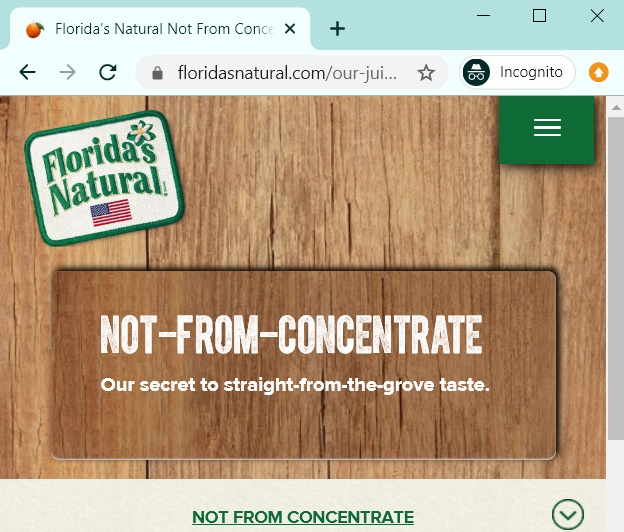
Much of the human taste comes from the smell
Our senses are all intrinsically linked so some of the ingredients in orange juice flavour packs are actually for fragrance.
It’s commonly said that 75-90% of taste comes from smell, but these numbers are unsubstantiated as it depends on a lot on the food and person.
What we do know is orange juice makers use the same companies that create fragrances for the large perfume makers.
North American orange juice is high in ethyl butyrate as this gives the smell of a fresh orange that people in the region react favourably to smelling once a carton of orange juice is opened.
Orange juice and forced labour
Brazil is the world leader in producing orange juice of all different standards from the concentrate budget orange to premium juice.
Almost half of the worlds orange juice comes from Brazil, but workers providing the oranges have been found to be working in slave conditions.
Sadly orange juice isn’t alone in our connected multinational world, but it has been singled out as one of the dirtiest products for modern slavery.
The dangers of thinking a food is healthy
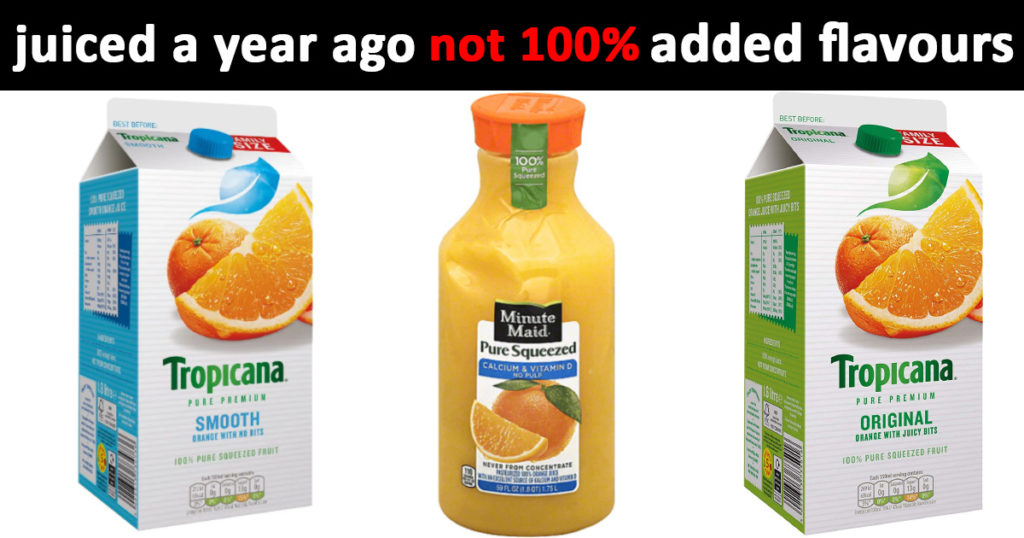
Health washing foods I believe is damaging as so many people are fooled into thinking something highly processed like packaged orange juice is healthy. Making them more likely to indulge in unhealthy foods and think they have had more nutrition than they actually have. So many have a glass of orange juice in the morning thinking it’s healthy and natural.
Food manufacturers are masters at fooling people unhealthy food is healthy. Like sugar-laden bars called “eat natural” or jars of Nutella that are mostly sugar and palm oil but the inclusion of hazelnuts and greenery on the jar subconsciously tries to make people think it’s healthier than it is.
It’s difficult to draw a conclusion that premium orange juice that’s been pasteurised, stored and had flavours added has zero health benefits and does more harm than good. But it’s easy to believe that it’s not even comparable to fresh juice.
Healthier alternatives to factory processed orange juice
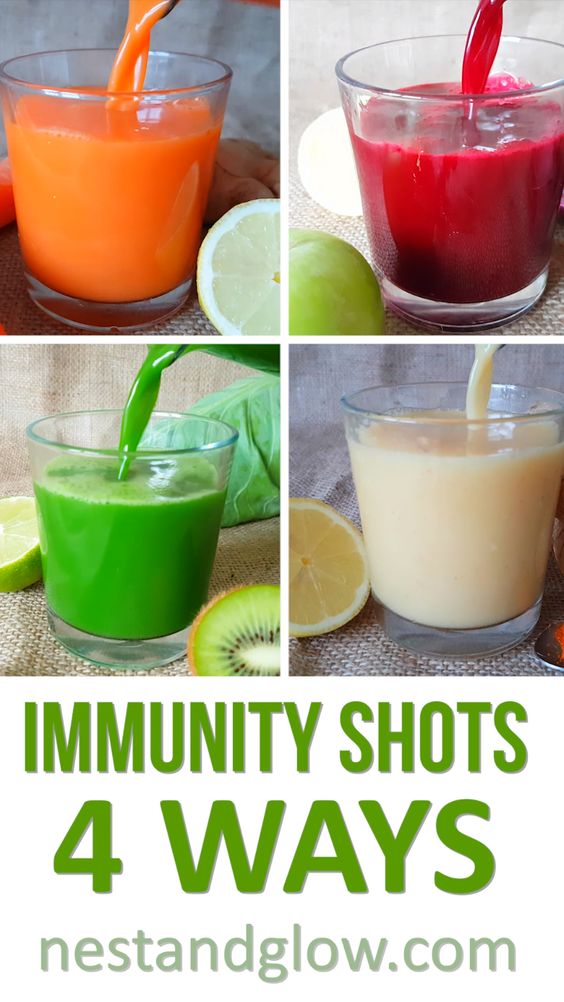
I do like juice, but I try to have semi-sweet high veggie juice for breakfast in place of orange juice. Try my recipes for juice shots.
It’s worthwhile juicing veggies like celery as it takes a long time to chew and first thing in the morning it’s easier on your digestion.
Without sounding patronising whole fruit is a great alternative to fruit juice. The fibre in fruit is filling and it will stop you from consuming too much sugar. With fruit juice, it’s easy to drink way too much sugar, and although it’s natural sugar too much of anything is bad and with shop bought juice it may be low in vitamins.
I hope you found this article on why premium orange juice isn’t as healthy as many people assume. Please don’t take away that you should never have orange juice, just be aware its a processed product and is not as pure, natural and honest as the packaging suggests.

Thank You for making the picture just a little bit more clearer for us!! God bless your honesty!!
Thanks, glad you found it useful 🙂
Thanks! I suspected as much but you clarified!